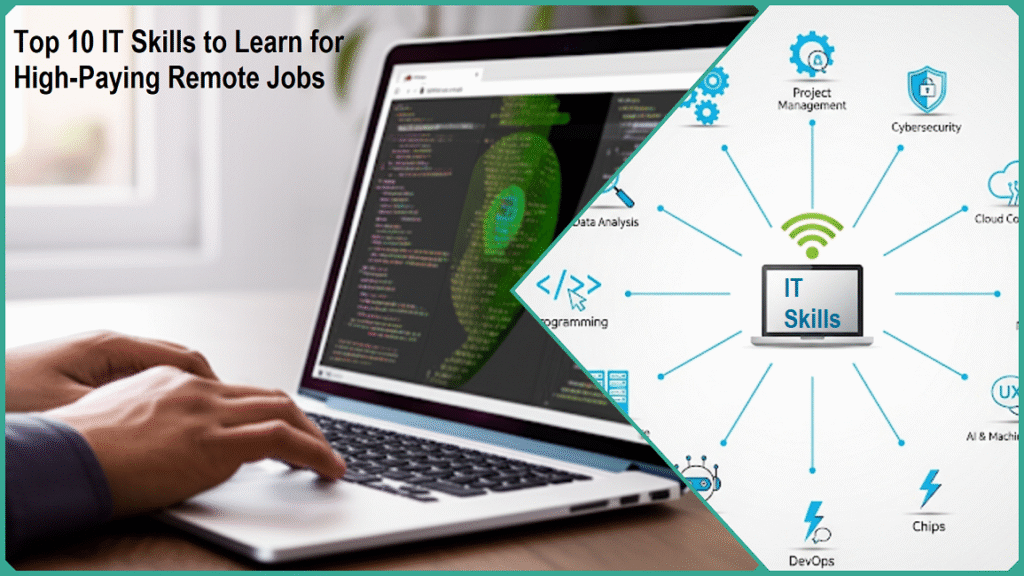Top 10 IT Skills to Learn for High-Paying Remote Jobs
Estimated reading time: 29 minutes
If you’re searching for a flexible and financially rewarding remote career in the tech industry, figuring out where to begin—or which specific skills to focus on—can often feel overwhelming and confusing. As technology continues to drive the future of work and reshape the job market, acquiring the right IT skills to learn becomes your essential shortcut to unlocking a variety of high-paying remote job opportunities.
This principle remains true regardless of your previous experience or background, which means that it is entirely possible for anyone, no matter their past or skill set, to enter the field and achieve success.
In this comprehensive and detailed guide, you’ll discover both clarity and confidence to help you navigate your career journey. We carefully break down the most valuable and in-demand IT skills that employers will be seeking in 2025 and beyond, while also debunking common myths and misconceptions about making a career change in the tech industry.

Additionally, we provide practical, actionable next steps that you can take immediately to move forward—no computer science degree or prior experience required. Whether you’re just starting from scratch or looking to upskill and advance your current position, your successful path to a rewarding IT career begins right here.
The Importance of IT Skills for Thriving in Remote Careers
The significance of IT skills for remote careers cannot be overstated in today’s increasingly competitive job market, especially as we continue to advance deeper into a digital-first economy that relies heavily on technology and virtual communication.
Here’s why these essential skills are crucial and play a pivotal role in shaping successful remote work opportunities:
High Demand Across the Globe
The technology sector continues to experience rapid expansion, with projections indicating that millions of new IT positions will be created across the globe over the next five years. The widespread adoption of digital transformation initiatives, increased reliance on cloud computing, and the significant growth of e-commerce platforms have all contributed to a surge in demand for skilled tech professionals.
As a result, IT roles continue to be among the fastest-growing and most highly sought-after positions across the globe, highlighting the essential and ever-increasing importance of technology in the modern economy today. This trend underscores how vital technological expertise has become for businesses and organizations striving to stay competitive and innovative in an increasingly digital world.
Superior Earning Potential
IT careers consistently and significantly outpace national averages when it comes to both salary levels and job growth rates. According to comprehensive industry surveys and market analyses, remote IT professionals often enjoy some of the highest median salaries available, frequently exceeding $100,000 annually in specialized fields such as cloud computing, cybersecurity, and software development.
Moreover, even entry-level roles within the technology sector typically begin with compensation packages that are considerably higher than those offered in many other professional fields and industries. This trend is largely driven by the high demand for tech skills and the critical role technology plays in modern business operations, making these positions not only more lucrative but also highly sought after by job seekers across various backgrounds.
Remote-First Mindset and Flexibility
Tech companies and startups were pioneers in the remote work revolution—and that mindset has only strengthened post-pandemic. Today, a significant portion of tech roles are advertised as “remote” or “hybrid” from the outset, providing professionals with the flexibility to work anywhere, whether at home, in a coworking space, or halfway around the world.
This remote-friendly culture significantly broadens and enhances opportunities for individuals who are actively seeking a better work-life balance, as well as for those who have important caregiving responsibilities. By embracing remote work, organizations create a more inclusive environment that accommodates diverse personal needs and schedules, ultimately supporting a healthier integration of professional and personal life.
Who Benefits from Building IT Skills?
- Career Changers: Individuals transitioning from non-technical fields such as retail, hospitality, or other service industries have the opportunity to secure more stable and significantly higher-paying positions by acquiring the appropriate technical skills through targeted upskilling programs. Numerous entry-level roles in the IT sector do not demand any previous experience in technology; instead, they primarily require a strong willingness to learn, adapt, and develop new competencies in the tech environment. This makes it an accessible and promising pathway for those eager to change their career trajectory.
- Recent Graduates: Graduates who are actively searching for their very first professional role will discover that having practical IT skills, which are often supported by relevant certifications and hands-on project experience, is currently in exceptionally high demand across many industries. Employers today are placing significantly less emphasis on traditional academic degrees and are instead focusing much more on the actual capabilities and technical competencies that candidates can demonstrate through real-world applications and achievements.
- Stay-at-Home Parents/Caregivers: The incredible flexibility offered by remote IT roles makes it completely possible to develop and maintain a rewarding and lucrative career while balancing family responsibilities or other personal commitments. This can all be achieved without the need for daily commuting or adhering to strict, inflexible working hours, allowing for a better work-life balance and more control over your schedule.
- Lifelong Learners and Underemployed Tech Workers: For individuals who are already working in the technology field but find themselves feeling stuck or underutilized, concentrating on developing high-demand IT skills can open up new opportunities. This focus can lead to higher salaries, access to more challenging and rewarding projects, and ultimately provide greater job security that is resilient to future industry changes and technological advancements.
In Summary
No matter where you begin—whether you’re a complete total beginner with no prior experience or someone who is tech-adjacent with some familiarity—the right IT skills serve as a direct and powerful pathway to significantly higher earnings, greater job stability, and genuine flexibility in your professional work life.
As remote and hybrid work environments continue to become the new standard across industries, having strong IT expertise remains one of the most reliable and effective ways to either launch a new career or advance an existing one that is both highly resilient to economic shifts and deeply rewarding on a personal and professional level.
Key Concepts and What Makes IT Skills Valuable
Gaining a solid understanding of a few key foundational concepts will greatly clarify why certain IT skills are highly sought after and how they play a crucial role in securing well-paying remote job opportunities. By grasping these essential ideas, you can better appreciate the value of specific technical abilities and how they fit into the broader landscape of remote work in the IT industry.
Here’s a comprehensive and detailed overview of all the essential information you need to know to get started effectively and confidently:
Hard Skills
These are specialized technical abilities that are directly connected to specific job-related tasks and responsibilities. In the context of IT roles, hard skills could encompass a variety of competencies such as:
- Coding and Programming Languages: Such as Python, JavaScript, Java, or C#—used to build websites, apps, and software solutions.
- Cybersecurity: Protecting networks, data, and systems from digital threats.
- Cloud Computing: Managing applications and infrastructure in platforms like AWS, Azure, or Google Cloud.
- Data Analytics: Extracting and interpreting valuable insights from data using Excel, SQL, Tableau, or Python.
Hard skills are typically acquired through a variety of structured methods such as formal academic courses, detailed tutorials, extensive hands-on practice, or recognized certification programs. When it comes to remote work, employers particularly require these hard skills to be demonstrable, up-to-date, and relevant to the specific tasks or projects the employee will be handling.
Soft Skills
These are highly transferable, interpersonal abilities that play a crucial role in helping you thrive and succeed in virtually any work environment—especially in remote teams where opportunities for face-to-face interaction are minimal. The most valuable and sought-after soft skills include:
- Problem-Solving: Approaching obstacles creatively and efficiently.
- Communication: Articulating ideas clearly, both in writing and virtually (e.g., via chat or video calls).
- Collaboration: Working as part of distributed, international teams.
- Adaptability: Staying versatile and open to new technologies and workflows.
Soft skills are frequently the key factors that distinguish exceptional remote workers from the rest. Employers understand very well that a candidate who possesses strong technical abilities alone will not achieve success if they lack reliability, effective communication, and a strong sense of self-motivation. These interpersonal and personal qualities are essential for thriving in a remote work environment where independence and collaboration go hand in hand.
Certification
A certification is a widely recognized industry credential that officially validates and demonstrates your expertise and proficiency in a specific area within the field of information technology (IT). Some common examples of these certifications include:
- AWS Certified Solutions Architect.
- CompTIA Security+ for cybersecurity.
- Certified Scrum Master (CSM) for project management.
- Microsoft Certified Data Analyst Associate.
Certifications hold tremendous value for those seeking remote job opportunities, acting as concrete evidence of your hands-on skills and expertise. They help to distinguish your resume from others, regardless of your level of formal education or traditional academic background. In the competitive world of remote work, having relevant certifications can significantly boost your credibility and showcase your commitment to continuous learning and professional development.
Portfolio
A portfolio is a carefully curated and thoughtfully organized collection of your completed projects—this might include websites you have built from scratch, dashboards you have designed with user experience in mind, or scripts you have written to solve specific problems. In the context of remote IT hiring:
- A strong portfolio often outweighs a college degree or theoretical coursework.
- It gives employers clear, tangible evidence of what you can do.
- Real-world projects (even personal or volunteer projects) count; link to GitHub, Behance, or your site.
For beginners and those looking to change their career paths, building a strong portfolio is one of the fastest and most effective methods to demonstrate your skills, showcase your expertise, and get noticed by potential employers for remote IT positions.
In Summary
- Hard skills get you in the door.
- Soft skills keep you there and help you thrive.
- Certifications add credibility.
- Portfolios showcase your real-world impact.
Investing in all four areas guarantees that you are effectively appealing to remote employers who are specifically seeking skilled, reliable, and demonstrably capable team members. By focusing on each of these key aspects, you significantly increase your chances of standing out as a well-rounded and highly desirable candidate for remote positions. This comprehensive approach ensures that employers recognize your full potential and value as a dedicated professional.
The Top 10 IT Skills to Learn for High-Paying Remote Jobs
In today’s rapidly evolving landscape of remote work, acquiring the right IT skills has become more important than ever, as it opens the door to a wide range of lucrative and flexible career paths that cater to various interests and lifestyles. Below, we present the top 10 IT skills to learn for securing high-paying remote jobs in 2025.
This carefully curated list is specifically designed for a diverse audience, including career changers looking to pivot into tech, recent graduates eager to start their professional journey, underemployed tech professionals seeking better opportunities, stay-at-home parents wanting to re-enter the workforce, and lifelong learners aiming to break into or advance within the ever-expanding tech industry.
Cloud Computing
- Average Salary (Remote): $120,000+
- Key Roles: Cloud Engineer, DevOps Specialist, Cloud Solutions Architect
- Why Learn: 90% of global businesses now operate on cloud infrastructures, relying on AWS, Azure, and Google Cloud. These platforms require skilled professionals for deployment, scaling, and security.
- Who Should Consider: Anyone seeking a fast-growing, high-pay field with certification pathways.
- Certifications: AWS Certified Solutions Architect, Azure Fundamentals
Cybersecurity
- Average Salary (Remote): $100,000+
- Key Roles: SOC Analyst, Security Engineer, Penetration Tester
- Why Learn: With cyber threats escalating, organizations need skilled professionals to protect data, networks, and remote work environments from attackers. Both beginner and advanced roles are available.
- Who Should Consider: Beginners, upskillers, and anyone looking to transition quickly.
- Certifications: CompTIA Security+, CISSP
Data Analytics
- Average Salary (Remote): $80,000–$120,000
- Key Roles: Data Analyst, BI Specialist, BI Developer
- Why Learn: Organizations need to turn data into actionable business insights. Entry-level roles often require only basic skills in SQL, Excel, or data visualization.
- Who Should Consider: Career switchers, upskillers seeking quick impact.
- Certifications: Google Data Analytics, Microsoft Certified Data Analyst
Software Development
- Average Salary (Remote): $110,000+
- Key Roles: Web Developer, Mobile App Developer, Full Stack Engineer
- Why Learn: The centerpiece of most tech jobs, coding (especially in JavaScript, Python, and Java) leads to work on web, mobile, and desktop applications.
- Who Should Consider: Those seeking coding-focused, project-based remote roles.
- Certifications: FreeCodeCamp, Codecademy Certificates
Project Management (Agile/Scrum)
- Average Salary (Remote): $90,000+
- Key Roles: Project Manager, Scrum Master
- Why Learn: Remote teams require skilled coordinators to ensure projects stay on track. Agile frameworks like Scrum are now industry-standard.
- Who Should Consider: Those with leadership or coordination strengths.
- Certifications: PMI-ACP, Certified Scrum Master (CSM)
UI/UX Design
- Average Salary (Remote): $85,000+
- Key Roles: UI/UX Designer, Product Designer
- Why Learn: As users engage digitally, the demand for user-friendly websites and apps increases. Designers do not always need coding skills.
- Who Should Consider: Creatives and non-coders who enjoy crafting user experiences.
- Certifications: Google UX Design, Nielsen Norman Group Certificates
Digital Marketing (SEO/SEM)
- Average Salary (Remote): $70,000–$100,000
- Key Roles: SEO Specialist, Digital Marketing Manager, SEO Lead
- Why Learn: Every online business needs digital strategies to attract and retain customers. Skills in SEO (Search Engine Optimization) and SEM (Search Engine Marketing) are especially in demand for remote work.
- Who Should Consider: Excellent communicators, copywriters, or career changers comfortable with data and creativity.
- Certifications: Google Digital Garage, HubSpot Inbound Marketing
IT Support & Help Desk
- Average Salary (Remote): $55,000–$75,000
- Key Roles: Remote IT Support, System Administrator, Help Desk Specialist
- Why Learn: Many entry-level tech jobs start with customer IT support, problem resolution, and basic administration—ideal for quick career pivots.
- Who Should Consider: Career changers or those seeking fast entry into remote tech work.
- Certifications: CompTIA ITF+, Google IT Support Professional
Artificial Intelligence & Machine Learning
- Average Salary (Remote): $120,000+
- Key Roles: ML Engineer, AI Specialist, AI Researcher
- Why Learn: AI/ML is transforming sectors from health to finance; even basic skills can unlock lucrative job roles involving Python, TensorFlow, or machine learning models.
- Who Should Consider: Advanced learners or those interested in high-growth job markets.
- Certifications: Coursera AI Specializations, Microsoft AI Fundamentals
DevOps & Automation
- Average Salary (Remote): $110,000+
- Key Roles: DevOps Engineer, Automation Engineer, Site Reliability Engineer
- Why Learn: Automation is the backbone of efficient tech operations. DevOps bridges development and IT operations, ensuring smooth deployments and uptime.
- Who Should Consider: Those interested in improving processes and systems efficiency.
- Certifications: AWS Certified DevOps Engineer, Docker Certified Associate
Summary of the Top 10 IT Skills to Learn for High-Paying Remote Jobs
| SKill | Salary (Remote) | Key Role | Best For |
|---|---|---|---|
| Cloud Computing | $120,000+ | Cloud Engineer, DevOps | High demand, certification |
| Cybersecurity | $100,000+ | SOC Analyst, Security Engineer | Beginners to advanced |
| Data Analytics | $80,000–$120,000 | Data Analyst, BI Specialist | Career switchers, upskillers |
| Software Development | $110,000+ | Web/App Developer, SWE | Coding-focused roles |
| Project Management (Agile) | $90,000+ | Scrum Master, Project Manager | Leadership, coordination |
| UI/UX Design | $85,000+ | UX Designer, Product Designer | Creatives, non-coders |
| Digital Marketing (SEO/SEM) | $70,000–$100,000 | Digital Marketer, SEO Lead | Communication-focused |
| IT Support & Help Desk | $55,000–$75,000 | Remote IT Support, Sysadmin | Quick-start remote roles |
| Artificial Intelligence & Machine Learning | $120,000+ | ML Engineer, AI Specialist | Advanced, high-growth |
| DevOps & Automation | $110,000+ | DevOps Engineer, Automation | Operations, efficiency |
Why These Skills Stand Out
- Cloud Computing & DevOps: Nearly every industry today is actively migrating its operations and infrastructure to cloud-based platforms, making expertise in these areas highly valuable. These skills are not only future-proof but also universally applicable across the globe, ensuring professionals remain in demand in a wide range of sectors for years to come.
- Cybersecurity: As remote work continues to expand rapidly across various industries, ensuring robust digital security has become an increasingly critical top priority for organizations worldwide. Protecting sensitive information and maintaining secure online environments are essential to prevent cyber threats and data breaches in this new work landscape.
- Data Analytics & AI/ML: In today’s rapidly evolving business landscape, companies increasingly require skilled professionals who possess the expertise to extract meaningful insights from vast amounts of data. Additionally, these experts are essential for designing and implementing automated processes that enhance efficiency and drive innovation across various operations.
- UI/UX & Development: Every successful digital product requires not only a skilled builder but also a creative and thoughtful designer to bring the vision to life. Both roles are essential in creating an engaging and functional user experience.
- Digital Marketing: In today’s highly crowded and competitive online world, professionals who are skilled at driving growth through digital marketing strategies will always be in high demand and play a crucial role in helping businesses succeed.
- IT Support: An excellent and straightforward pathway designed specifically for entry-level candidates as well as individuals looking to make a career change into the technology field. This role serves as a foundational starting point, offering valuable hands-on experience and opportunities for growth in the IT industry.
Investing your time and effort in developing any of these valuable IT skills can serve as a powerful launching pad for establishing a flexible, well-compensated remote career—regardless of where you begin your journey.
The essential factors to success include consistent practice, continuous learning to stay updated with the latest trends, and creating real-world projects that effectively showcase your talents and abilities to potential employers or clients.
Remote Job IT Skills Current Trends & Developments
Current trends and developments in remote IT skills and careers for the year 2025 highlight and emphasize several important and key points that are shaping the future landscape of the industry:
Remote Work is Here to Stay
Nearly half of IT professionals currently work at least partially remotely in the post-pandemic world, reflecting a significant shift in workplace dynamics. Many surveys consistently show a strong preference among employees for flexible work arrangements, with many job seekers now prioritizing remote or hybrid work options even over higher salary offers.
These remote and hybrid work setups are increasingly becoming the norm rather than the exception within the IT sector, fundamentally changing how companies approach talent acquisition and employee satisfaction.
Skills Over Degrees
Employers nowadays are placing a much greater emphasis on practical, demonstrable skills and industry-recognized certifications rather than relying solely on traditional formal degrees, particularly when it comes to remote job opportunities.
This evolving trend effectively lowers the barriers to entry for individuals looking to change careers, recent graduates entering the workforce, and self-taught professionals who may not have followed a conventional educational path.
As a result, building a strong, hands-on portfolio combined with earning relevant certifications has become increasingly important and carries substantial weight in the hiring decisions made by companies across various industries.
AI & Automation Integration
AI-driven tools and automation technologies have become foundational and indispensable in many rapidly evolving fields such as data analysis, software development, cloud computing, and digital marketing.
Gaining even a basic understanding and familiarity with AI concepts and machine learning frameworks, including popular tools like Python and TensorFlow, significantly broadens your career opportunities. This knowledge opens doors to numerous high-growth, in-demand, and well-paying roles, especially within the expanding remote IT job market, where expertise in these areas is highly valued and sought after.
Cybersecurity Everywhere
With the rapid rise and widespread adoption of remote work, cybersecurity has become an essential and critical aspect for virtually all IT roles across various industries. The need to protect sensitive data and robust infrastructure against an ever-increasing number of sophisticated cyber threats is no longer a responsibility that falls solely on specialized security experts.
Instead, general IT professionals are now expected to possess a fundamental and comprehensive baseline knowledge of security principles and practices. This significant shift in the workplace environment has greatly fueled the demand for cybersecurity skills across the entire IT sector, making it a vital competency for professionals at all levels.
In Summary
Remote IT careers in 2025 are characterized by a continued and strong commitment to a remote-first work culture, where employees primarily work from home or other remote locations rather than traditional office settings. There is a clear and growing preference for hiring based on demonstrated skills and practical experience rather than solely relying on formal degrees or academic qualifications.
Additionally, the widespread adoption and integration of artificial intelligence (AI) and automation technologies are transforming how IT professionals operate and the kinds of expertise that are in demand.
Alongside these developments, there is an increasing and universal focus on cybersecurity across all sectors, emphasizing the importance of protecting data and digital assets. Together, these significant trends are shaping the most valuable and sought-after skills for securing high-paying remote IT positions in the coming years.
How to Start: Actionable Steps Toward a High-Paying Remote IT Career
Embarking on a remote IT career might initially seem intimidating and overwhelming, but by breaking the process down into clear, manageable, and well-defined steps, the entire journey becomes achievable and accessible for anyone. This applies whether you are a complete beginner just starting or someone ready to upskill and enhance your qualifications to land a more lucrative and rewarding remote role.
Below is a carefully crafted, step-by-step action plan designed specifically to help guide you through the transition successfully and confidently:
Choose Your Path
Start by picking an IT skill that genuinely excites you and matches your strengths or prior experiences. Explore remote job postings on platforms like LinkedIn, Remote.co, or We Work Remotely to understand which skills are in demand and what employers are truly looking for in candidates. Reading real job descriptions helps you focus your learning and quickly spot recurring requirements (e.g., Python for data analytics, AWS for cloud roles, or Figma for UI/UX design).
Action:
- Make a list of the top remote IT jobs that appeal to you.
- Note down the technical skills, tools, and certifications most frequently mentioned.
Leverage Free Learning Resources
There’s no need to invest in expensive degrees or costly programs—there are hundreds of free or very low-cost resources available online that can help you get started effectively. The following platforms provide a wide range of beginner-friendly courses specifically designed to develop your IT skills and help you build a strong foundation in the field:
- Google IT Certificates: Entry-level programs in support, data analytics, project management, and UX design. Includes hands-on projects and widely respected credentials.
- Codecademy: Interactive coding lessons for web development, data science, and more. Great for learning by doing.
- Coursera: University-backed IT courses in everything from cloud computing to cybersecurity, with many audit-for-free options.
- FreeCodeCamp: Completely free, project-based curriculum for web development and JavaScript—perfect for beginners who want to build real-world projects as they learn.
Action:
- Enroll in at least one introductory course in your chosen field.
- Set a learning schedule (even 20 minutes per day can create momentum).
Build a Portfolio
Employers place a much higher value on clear proof of practical ability compared to just theoretical knowledge—this is especially true when it comes to remote roles where demonstrating real-world skills matters even more. To get started, begin building a strong portfolio filled with small, focused projects that are directly relevant to the specific skills you want to showcase and develop for your target role:
- Aspiring developers: Build a personal website, a weather app, or contribute to an open-source project.
- Data analysts: Create a dashboard using public data (e.g., COVID-19 stats or sports scores) and showcase your Excel or Tableau skills.
- Digital marketers: Develop a mock SEO campaign for a pretend business, or optimize a blog for search.
- UI/UX designers: Redesign a popular website or craft prototypes in Figma.
You can showcase these projects on popular platforms such as GitHub, which is ideal for sharing and managing your code repositories. For design-focused projects, platforms like Behance or Dribbble are excellent choices to visually present your creative work.
Additionally, creating and maintaining your simple portfolio website allows you to have full control over how your projects are displayed and can serve as a centralized hub for all your professional work.
Action:
- Complete and document at least one small project in your chosen area.
- Include a clear description of your thought process and results.
Earn Beginner Certifications
While not always required, certifications provide third-party validation of your skills and can help you stand out—especially if you’re transitioning from a non-IT field. Many entry-level certifications are accessible and can be completed within weeks or months:
- Google IT Support Certificate (Coursera)
- AWS Certified Cloud Practitioner
- CompTIA ITF+ or CompTIA A+ (for IT support)
- Google Data Analytics or Google UX Design (Coursera)
- HubSpot Inbound Marketing Certification (free)
Action:
- Choose one beginner-friendly certification aligned with your chosen path and work toward completion.
Apply Constantly and Refine Your Approach
Remote IT jobs are highly competitive and in demand—so it is crucial to start applying as early as possible, even while you are still learning new skills. Engaging in the application process early on not only increases your chances of landing a role but also provides valuable benefits such as helping you identify any gaps in your skill set, gaining much-needed interview experience, and allowing you to continually refine and improve your portfolio or resume to better showcase your abilities.
- Customize your application for each job.
- Use your projects and certifications to demonstrate initiative.
- Don’t be discouraged by rejections—treat each as feedback and keep improving.
Action:
- Set a weekly goal (e.g., five targeted applications).
- Track your progress and regularly update your skills and projects based on employer feedback and market demand.
Pro Tips for Success
- Join Online Communities: Engage in forums like Reddit (e.g., r/ITCareerQuestions), Discord groups, or LinkedIn communities for peer support, accountability, and advice.
- Network Remotely: Attend virtual meetups and webinars relevant to your focus area.
- Iterate and Specialize: As you gain experience, specialize further (e.g., from generic “IT support” to cloud-focused support or cybersecurity), increasing your market value.
Taking The First Step
Every remote IT professional started somewhere, often with no prior experience. By choosing your path intentionally, leveraging free resources, building a small but mighty portfolio, gaining certifications, and applying persistently, you can open doors to the flexible, high-paying remote tech career you’re seeking.
Remember: Consistency beats intensity every time. Taking small, manageable steps daily gradually leads to significant and lasting results that truly make a difference over time.
Real-World Case Studies: From Zero to Remote IT Success
Nothing illustrates the transformative power of IT skills better than real-life journeys of ordinary people stepping into tech—and quickly building lucrative, flexible remote careers. Here are two motivational case studies that prove anyone can succeed with focused effort and smart learning choices:
Maria: From Retail Manager to Remote Data Analyst
Maria worked for years in retail management, facing erratic hours and stagnant wages. Wanting stability and better income without giving up flexibility, she decided to explore IT—but didn’t know where to start.
Steps Taken:
- Chose data analytics after noticing its frequent mention in remote job ads and its suitability for problem-solvers.
- Enrolled in the Google Data Analytics Certificate on Coursera, an entry-level program designed for beginners.
- Built a public data dashboard project using Excel and Tableau, analyzing sales trends from open datasets.
- Documented her process and results on GitHub and LinkedIn to showcase her abilities.
- Applied to remote data-focused roles while completing the course.
Results: Within 6 months, Maria landed a remote business analyst position. Her combination of a recognized certification and a functional, real-world project portfolio made her stand out—even with no previous tech experience.
James: Stay-at-Home Dad to Remote Developer
James left his job to be a full-time parent, but wanted to contribute financially—without giving up family time or commuting. He had dabbled in tech but never deeply.
Steps Taken:
- Researched software development pathways, discovering plenty of remote roles for web and Python programmers.
- Used free online resources (like FreeCodeCamp and Codecademy) to learn Python and the basics of web development.
- Built small practical projects—like a budget tracker and an interactive website—to practice skills.
- Started offering freelance services for simple web projects, building up client testimonials, and more portfolio pieces.
- After gaining confidence and experience, I applied for permanent remote developer jobs.
Results: After about a year, James transitioned from part-time freelancing to a full-time remote software developer position. He credits his success to consistent, hands-on learning and starting with manageable, real-world projects—even as a busy parent.
Key Takeaways
- You don’t need a tech degree or background: Both Maria and James started from scratch, using practical, project-based learning.
- Certifications matter: Entry-level certs and real-world projects can make you stand out quickly.
- Consistency is key: Progress—even 20 minutes a day—adds up fast.
- Portfolio over perfection: Showcasing your ability, however basic, is more valuable than waiting to be “ready.”
These stories prove there’s a path into IT for everyone. By choosing a skill, accessing free or affordable resources, completing hands-on projects, and applying steadily, you can build a flexible, rewarding remote career regardless of your starting point.
FAQs
Can I get an IT job with no experience?
Many remote IT roles are designed for beginners, especially those willing to learn and demonstrate practical skills. By starting with entry-level certifications (like the Google IT Support Certificate or CompTIA ITF+) and building basic projects (such as a simple website or data dashboard), you can make your application stand out to employers. Practical, hands-on skills and a strong learning attitude often outweigh previous experience.
Do I need a computer science degree?
Today’s IT job market, particularly for remote positions, prioritizes demonstrable skills, certifications, and real-world portfolios. Employers frequently hire candidates without formal degrees as long as they can show competence through projects, certifications (e.g., AWS Certified Cloud Practitioner, Google Data Analytics), and relevant self-study. Focus on building and showcasing your capabilities; degrees are far less important than what you can do.
How quickly can I transition into IT?
For motivated career changers, transitioning into an entry-level IT role can often happen within 6 to 12 months of focused study and portfolio building. Success stories show that with consistency—spending even 20–30 minutes per day on learning and projects—many people make the jump in under a year. Certifications and public project portfolios (on GitHub, Behance, or a personal website) dramatically accelerate your job-readiness.
Are IT skills in demand for remote work?
The remote IT job market is thriving, with especially high demand in fields like cloud computing, cybersecurity, and software development. Surveys and job board data indicate that the majority of high-paying remote jobs are tech-related, and employers are eager for candidates with up-to-date, practical IT skills. This demand is expected to grow year over year as more businesses go digital and distributed.
Which IT skill pays the most for remote roles?
Currently, remote roles in Artificial Intelligence/Machine Learning (AI/ML), cloud computing, and DevOps/automation command the highest salaries, frequently exceeding $120,000 per year for professionals with intermediate to advanced expertise. These fields are at the forefront of digital transformation, making them especially lucrative career paths for those looking to maximize earning potential and job security.
In Conclusion
The rapidly changing technology landscape presents tremendous opportunities for anyone motivated to learn new IT skills. Whether your primary driver is the flexibility of remote work, higher earning potential, or enhancing your long-term career resilience, the best time to start is now. By focusing on just one of the top 10 high-value IT skills, you can unlock a new path to success—even without prior experience.
Key Takeaways
- Invest in skills that align with your passion and job market demand. Research what excites you and what roles are trending in remote work to ensure you’re both happy and employable.
- Don’t let lack of experience hold you back. Every expert in IT started as a beginner. Entry-level certifications and small, practical projects are often all you need to demonstrate your capability to employers.
- Build a portfolio with real-world projects. Employers want proof of your abilities. Start with small, hands-on tasks—like creating a website, developing a dashboard, or running a digital marketing campaign—to showcase on GitHub, Behance, or your site.
- Keep your knowledge fresh. The most successful remote IT professionals make learning a habit. The industry constantly evolves, so staying curious and proactive will keep you ahead.
Are your ready to Take the Leap and Embrace New Opportunities?
Start with just one skill that excites you. Set a simple, achievable goal—such as completing a foundational certification or building a small project within 30 days. Progress comes from consistent, focused effort, and each milestone builds your confidence and employability.
If this guide encouraged you or gave you clarity, consider sharing your story in the comments below. We’d love to hear about your journey! For more resources, updates, and expert tips on building a future-proof remote career, subscribe to our newsletter and become part of our growing community of tech learners and achievers. Your flexible, rewarding tech career starts today—one step at a time.
Discover more from Skill to Grow
Subscribe to get the latest posts sent to your email.






